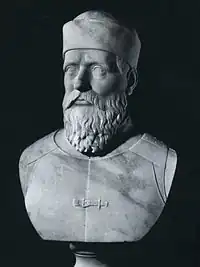Vettor Pisani
Vettor Pisani (1324 – 13 August 1380) was a Venetian admiral.

Career

by Francesco Hayez
He was in command of the Venetian fleet in 1378 during the war against the Genoese, whom he defeated off Capo d'Anzio; subsequently he recaptured Cattaro, Sebenico and Arbe, which had been seized by the Hungarians, the allies of the Genoese. But the Genoese fleet completely defeated Pisani at Pola in May 1379, and on his return to Venice he was thrown into prison.
The Genoese then pressed home their victory, and besieged and captured Chioggia, whereby Venice itself was in danger. The people thereupon demanded the liberation of Pisani, in whose skill they had the fullest confidence.[1]
The government gave way and appointed the aged commander admiral of the fleet once more. Through his able strategy and daring he recaptured Chioggia, defeated the Genoese and threatened Genoa itself until that republic agreed to peace terms.[1]
Pisani died in 1380 while on his way to Manfredonia with a squadron to ship provisions.[1] He is buried in the Basilica of San Giovanni e Paolo, Venice.
Several ships have borne his name, including Vettor Pisani, an armored cruiser built in the 1890s and the submarine Vettor Pisani, which operated during World War II.
A statue of him is #14 at the Prato della valle, Padua. His home in Venice is believed to have been in a building which is now part of the Hotel Saturnia.

References
- One or more of the preceding sentences incorporates text from a publication now in the public domain: Chisholm, Hugh, ed. (1911). "Pisani, Vettor". Encyclopædia Britannica. Vol. 21 (11th ed.). Cambridge University Press. p. 647.
- Roger Crowley, City of Fortune - How Venice Won and lost a Naval Empire, Faber and Faber, London, 2011 ISBN 978-0-571-24594-9
- Vittorio Lazzarini, La morte e il monumento di Vettor Pisani, in the Nuovo archivio veneto, vol., xi., pt. ii. (1896).
External links
![]() Media related to Vettor Pisani at Wikimedia Commons
Media related to Vettor Pisani at Wikimedia Commons